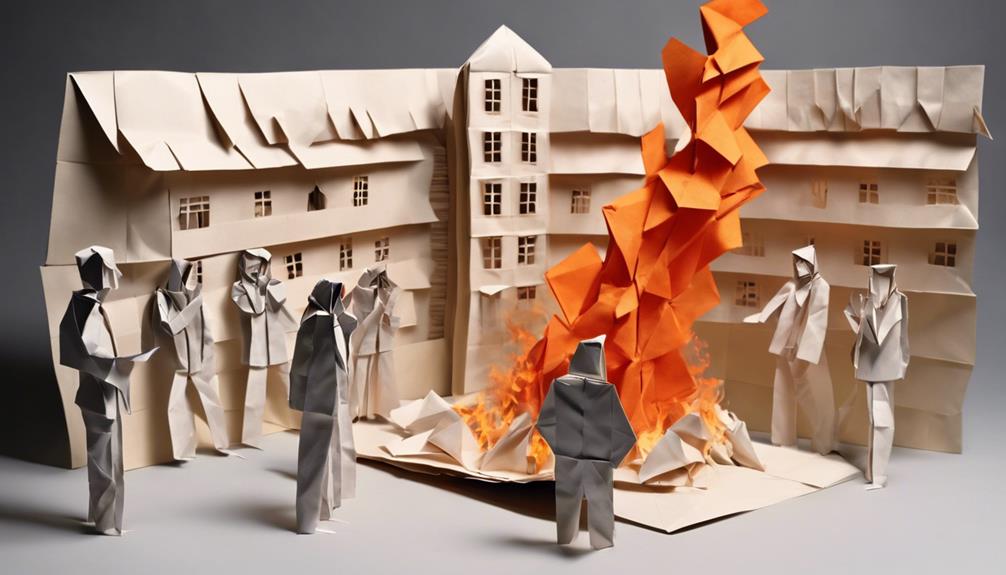You might not realize the extent of how fire incidents can deeply affect individuals involved. The aftermath of such events can linger, impacting mental well-being in various ways. From survivors facing trauma to first responders carrying emotional burdens, the psychological toll is profound. Bystanders also witness distressing scenes that can leave lasting impressions. Understanding these complexities is crucial in addressing the long-term effects and implementing effective strategies for recovery and resilience. But how exactly do these experiences shape individuals' mental health and what can be done to support them through the process?
Impact on Survivors

Experiencing a fire incident can have profound psychological effects on survivors, impacting their emotional well-being and sense of security. It's common to feel survivor guilt, questioning why you made it out when others didn't. These feelings are valid and part of the healing process. Coping strategies are essential; remember to be kind to yourself and seek professional help if needed.
Community support plays a crucial role in the recovery of survivors. Knowing you're not alone and that others care about your well-being can be incredibly comforting. Connecting with support groups or engaging in community events can help rebuild a sense of security and belonging. Your mental health matters, and it's okay to prioritize it during this challenging time. Remember, healing is not a linear process, and it's okay to seek help along the way. You deserve to feel safe and supported as you navigate through the aftermath of a fire incident.
Emotional Toll on First Responders
As a first responder, the stress and emotional toll of witnessing traumatic events can be immense. The constant exposure to danger and crisis situations puts you at a higher risk for developing PTSD. It's crucial to prioritize your mental health and seek support to cope with the challenges you face in the line of duty.
First Responder Stress
The emotional toll on first responders in the aftermath of fire incidents is a significant aspect of their experience that warrants attention and support. Being at the forefront of emergencies can take a heavy mental toll. Here are some ways to address first responder stress:
- Encourage Peer Support: Establishing a system where first responders can talk to and support each other can be beneficial.
- Provide Mental Health Resources: Access to counseling and therapy can help in processing traumatic events.
- Promote Physical Well-being: Regular exercise and healthy eating habits can positively impact mental health.
- Offer Training on Coping Strategies: Equipping responders with techniques to manage stress can enhance their resilience.
Supporting first responders in prioritizing their mental well-being is crucial for their overall health and ability to continue serving the community effectively.
PTSD Risk in Responders
Navigating the intensity of fire incidents can heighten the risk of PTSD in responders, amplifying the emotional toll they bear in the line of duty. The weight of what you witness and experience can take a significant toll on your mental health. It's crucial to acknowledge the impact these traumatic events can have on you, both during and after the incident. Your resilience as a responder is admirable, but it's essential to prioritize your mental well-being and seek support when needed. Trauma recovery is a journey that requires strength and vulnerability. Remember, it's okay to not be okay sometimes. Taking care of your responder mental health is not a sign of weakness but a testament to your courage and commitment to serving others.
Psychological Effects on Bystanders

As a bystander witnessing a fire incident, you might experience a range of emotions and stress responses. These could manifest as symptoms of emotional distress, impacting your mental well-being. Remember that seeking support from friends, family, or mental health professionals can be crucial in helping you cope with the psychological effects of being a bystander to such traumatic events.
Bystander Stress Response
Understanding how witnessing a fire incident can impact your psychological well-being is crucial in recognizing and addressing bystander stress response. It's normal to feel overwhelmed or anxious after witnessing such events. Here are some ways to support yourself during this time:
- Seek community support to share your feelings and experiences.
- Practice coping mechanisms like deep breathing or mindfulness to manage stress.
- Be patient with your mental health; healing is part of the recovery process.
- Remember that it's okay to ask for help if you're struggling to cope with the aftermath of the fire incident.
Emotional Distress Symptoms
Witnessing a fire incident can trigger a range of emotional distress symptoms in bystanders, impacting their psychological well-being significantly. Bystanders may experience symptoms such as anxiety, fear, helplessness, and guilt. These emotions can be overwhelming and challenging to navigate alone. Seeking counseling resources can provide a safe space to process these feelings and develop coping strategies. Engaging in activities like mindfulness, journaling, or talking to a trusted individual can also help manage emotional distress. Remember, it's essential to prioritize your mental health during challenging times. Below is a table summarizing common emotional distress symptoms:
| Emotional Distress Symptoms |
|---|
| Anxiety |
| Fear |
| Helplessness |
| Guilt |
Support Systems for Bystanders
Experiencing emotional distress symptoms after witnessing a fire incident underscores the importance of establishing effective support systems for bystanders to navigate the psychological effects of such traumatic events. It's crucial to recognize the impact these incidents can have on your mental well-being and seek the necessary support. Here are some ways to access the help you may need:
- Community Outreach: Engage with local community resources that offer support and understanding.
- Mental Health Support: Seek professional help from therapists or counselors specializing in trauma.
- Peer Support Groups: Connect with others who have gone through similar experiences for shared understanding.
- Self-Care Strategies: Practice self-compassion, relaxation techniques, and healthy coping mechanisms to manage distress.
Trauma Responses and Coping Mechanisms

In times of trauma, finding effective coping mechanisms can significantly aid in the recovery process. Coping strategies play a crucial role in helping individuals navigate the intense emotions and distress that often accompany traumatic experiences. When faced with the aftermath of a fire incident, it is normal to feel overwhelmed, anxious, or scared. It's essential to remember that these feelings are valid and that there are ways to cope with them.
One coping mechanism that can be helpful is seeking support from friends, family, or mental health professionals. Talking about your experience and emotions can provide a sense of relief and help you process what you've been through. Engaging in activities that bring you comfort and relaxation, such as meditation, exercise, or spending time in nature, can also be beneficial in managing trauma recovery.
Long-Term Mental Health Challenges
Dealing with long-term mental health challenges following a fire incident can be a complex and arduous journey, requiring patience and resilience. It's important to acknowledge the impact such events can have on your mental well-being and seek the necessary support and resources to aid in your recovery. Here are some key points to consider:
- Trauma Recovery: Recognize that healing from the emotional wounds caused by the fire may take time and involve various stages of processing. It's crucial to be gentle with yourself during this process and seek professional help if needed.
- Mental Health Support: Utilize available mental health services and resources to address any lingering issues such as anxiety, depression, or post-traumatic stress disorder. Surround yourself with a supportive network of friends, family, or therapists who can assist you in navigating these challenges.
- Self-Care Practices: Engage in self-care activities that promote relaxation and emotional well-being, such as meditation, exercise, or journaling. Taking care of your mental health is a vital part of the recovery journey.
- Community Connection: Connect with others who have experienced similar traumas, either through support groups or online communities. Sharing your story and listening to others can foster a sense of belonging and understanding, aiding in your healing process. Remember, you are not alone in this journey towards mental well-being.
Strategies for Healing and Resilience

Navigating the journey towards healing and resilience after a fire incident can be challenging yet crucial for your well-being and recovery. Implementing effective healing techniques and resilience strategies is essential in rebuilding your emotional strength and finding inner peace. One powerful technique is mindfulness meditation, which can help you manage stress, anxiety, and trauma by fostering awareness of the present moment. Journaling is another valuable tool that allows you to express your emotions, track your progress, and gain insights into your healing journey.
Engaging in physical activities like yoga or exercise not only promotes physical well-being but also enhances mental resilience. Connecting with a support group or therapist can provide you with a safe space to share your feelings, receive guidance, and cultivate a sense of community. Additionally, practicing self-care activities such as proper nutrition, sufficient sleep, and relaxation techniques can nurture your body and mind during this challenging time.
Frequently Asked Questions
Can Survivors of Fire Incidents Experience Survivor's Guilt and How Can They Cope With It?
When dealing with survivor's guilt following a fire incident, it's vital to acknowledge your emotions and seek support. Coping strategies like therapy, connecting with others who understand, and practicing self-compassion can help you navigate these complex feelings. Remember, healing is a journey, and it's okay to seek help along the way. Embrace your strength and resilience as you work towards mental health recovery; you deserve the support and understanding to overcome survivor's guilt.
What Are Some Lesser-Known Psychological Effects That Firefighters May Face After Responding to a Fire Incident?
When firefighters respond to fire incidents, they may experience various psychological effects beyond what's commonly known. These can include heightened stress, survivor's guilt, and even PTSD. To cope, consider seeking peer support or therapy options. Engaging in mindfulness practices and resilience-building activities can also help you process these experiences. Remember, it's essential to prioritize your mental well-being and seek help when needed. You're not alone in facing these challenges.
How Do Bystanders Who Witness a Fire Incident Often React Psychologically, and What Support Is Available for Them?
When you witness a fire incident, your emotional reactions can be intense and overwhelming. It's normal to feel scared, anxious, or helpless. Remember that there is community support available to help you navigate these feelings. Counseling services and mental health support can provide a safe space for you to process what you've experienced. Don't hesitate to reach out for help and take advantage of the resources that can assist you in coping and healing.
Are There Specific Coping Mechanisms That Are Particularly Effective in Managing Trauma Responses Following a Fire Incident?
When dealing with trauma after a fire incident, remember to practice mindfulness and consider cognitive behavioral therapy. Support groups and art therapy can also aid in your recovery journey. These coping mechanisms can provide a safe space for you to process your emotions and thoughts. By engaging in these practices, you may find a sense of relief and empowerment as you navigate through the healing process. Remember, you are not alone in this journey.
What Are Some Unique Long-Term Mental Health Challenges That May Arise for Individuals Who Have Experienced a Fire Incident, and How Can They Be Addressed?
When you've been through a fire, you might face long-term mental health challenges like anxiety or PTSD. It's tough, but trauma recovery is possible with the right support. Reach out for mental health support early on. Therapy and counseling can help you process the experience and develop coping skills. Remember, you're not alone in this journey. Taking care of your mental well-being is a crucial step toward healing.



